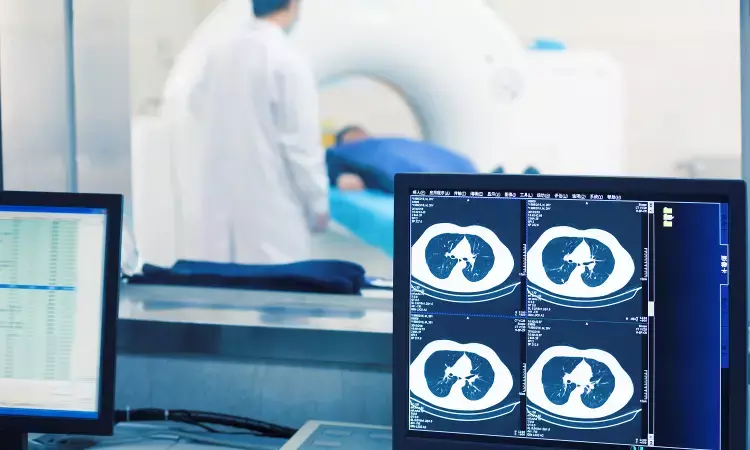- Home
- Medical news & Guidelines
- Anesthesiology
- Cardiology and CTVS
- Critical Care
- Dentistry
- Dermatology
- Diabetes and Endocrinology
- ENT
- Gastroenterology
- Medicine
- Nephrology
- Neurology
- Obstretics-Gynaecology
- Oncology
- Ophthalmology
- Orthopaedics
- Pediatrics-Neonatology
- Psychiatry
- Pulmonology
- Radiology
- Surgery
- Urology
- Laboratory Medicine
- Diet
- Nursing
- Paramedical
- Physiotherapy
- Health news
- Fact Check
- Bone Health Fact Check
- Brain Health Fact Check
- Cancer Related Fact Check
- Child Care Fact Check
- Dental and oral health fact check
- Diabetes and metabolic health fact check
- Diet and Nutrition Fact Check
- Eye and ENT Care Fact Check
- Fitness fact check
- Gut health fact check
- Heart health fact check
- Kidney health fact check
- Medical education fact check
- Men's health fact check
- Respiratory fact check
- Skin and hair care fact check
- Vaccine and Immunization fact check
- Women's health fact check
- AYUSH
- State News
- Andaman and Nicobar Islands
- Andhra Pradesh
- Arunachal Pradesh
- Assam
- Bihar
- Chandigarh
- Chattisgarh
- Dadra and Nagar Haveli
- Daman and Diu
- Delhi
- Goa
- Gujarat
- Haryana
- Himachal Pradesh
- Jammu & Kashmir
- Jharkhand
- Karnataka
- Kerala
- Ladakh
- Lakshadweep
- Madhya Pradesh
- Maharashtra
- Manipur
- Meghalaya
- Mizoram
- Nagaland
- Odisha
- Puducherry
- Punjab
- Rajasthan
- Sikkim
- Tamil Nadu
- Telangana
- Tripura
- Uttar Pradesh
- Uttrakhand
- West Bengal
- Medical Education
- Industry
Virtual CT scans cut patient radiation exposure in half during PET/CT studies

A novel artificial intelligence method can be used to generate high-quality "PET/CT" images and subsequently decrease radiation exposure to the patient. Developed by the National Cancer Institute, the method bypasses the need for CT-based attenuation correction, potentially allowing for more frequent PET imaging to monitor disease and treatment progression without radiation exposure from CT acquisition. This research was presented at the Society of Nuclear Medicine and Molecular Imaging 2022 Annual Meeting.
Cancer patients often undergo several imaging studies throughout diagnosis and treatment, potentially including multiple PET/CT scans in close succession. The CT portion of the exam contributes to a patient's overall radiation exposure yet is largely redundant. In this study, researchers sought to reduce or eliminate the need for low-dose CT in PET/CT by using an artificial intelligence model to generate virtual attenuation-corrected PET scans.
The data cohort for artificial intelligence model development included 305 18F-DCFPyL PSMA PET/CT studies. Each study contained three scans: non-attenuation-corrected PET, attenuation-corrected PET, and low-dose CT. Studies were broken down into three sets for training (185), validation (60) and testing (60). A 2D Pix2Pix generator was then used to generate synthetic attenuation-corrected PET scans (gen-PET) from the original non-attenuation-corrected PET.
For qualitative evaluation, two nuclear medicine physicians reviewed 40 PET/CT studies in a randomized order, blinded to whether the image was from original attenuation-corrected PET or gen-PET. Each expert recorded the number and locations of PET-positive lesions and qualitatively reviewed overall noise and image quality. The readers were able to successfully detect lesions on the gen-PET images with reasonable sensitivity values.
"High-quality artificial intelligence-generated images preserve vital information from raw PET images without the additional radiation exposure from CT scans," said Kevin Ma, PhD, a post-doctoral researcher at the National Cancer Institute in Bethesda, Maryland. "This opens opportunities for increasing the frequency and number of PET scans per patient per year, which could provide more accurate assessment for lesion detection, treatment efficacy, radiotracer effectivity, and other measures in research and patient care."
For further information log on to:
http://www.snmmi.org/NewsPublications/NewsDetail.aspx?ItemNumber=40989
Dr Kamal Kant Kohli-MBBS, DTCD- a chest specialist with more than 30 years of practice and a flair for writing clinical articles, Dr Kamal Kant Kohli joined Medical Dialogues as a Chief Editor of Medical News. Besides writing articles, as an editor, he proofreads and verifies all the medical content published on Medical Dialogues including those coming from journals, studies,medical conferences,guidelines etc. Email: drkohli@medicaldialogues.in. Contact no. 011-43720751


